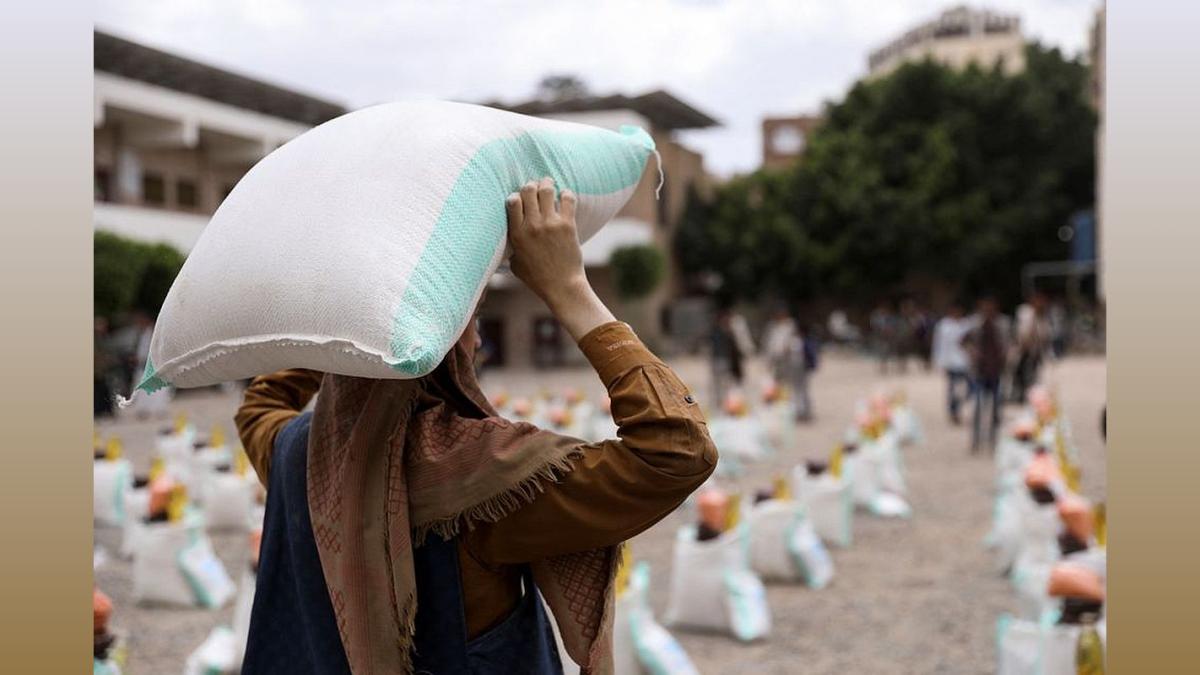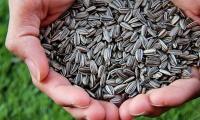WTO Ministerial Meet Deadlocked: India Pushes for Farmer, Fishermen Interests
The 13th WTO ministerial conference in Abu Dhabi has been extended as members struggle to reach consensus on key issues including agriculture, fisheries subsidies, and e-commerce moratorium. India remains steadfast in protecting the interests of farmers and fishermen.

Photograph: Khaled Abdullah/Reuters
Abu Dhabi, Mar 1 (PTI) WTO members have not yet reached a consensus on key issues of agriculture, fisheries subsidies and e-commerce moratorium even as the talks entered the fifth day on Friday while India maintains its stand of fully protecting the interest of farmers and fishermen, an official said.
Though hectic parleys are going on to bridge the differences between developed and emerging economies on these issues, things have not moved much, the official said.
The 13th ministerial conference (MC), which was supposed to end on February 29 has been extended by a day due to the logjam.
"India has clearly stated that it would not compromise on the interest of farmers and fishermen at the WTO ministerial meeting. India is already into sustainable fishing and there should be no restrictions on subsidies for them. There is no agreement so far on the demand to end subsidies for undertaking distant water fishing," another official said.
The Cairns group, comprising countries like Australia and Brazil, has claimed that public stockholding is market-distorting and that there should be no export restrictions. Food-importing countries like Japan and Singapore are pushing for predictability in farm policies.
On the other hand, the US wants market access for its agri commodities, and the EU wants a cut in subsidies. The talks are also underway to end the moratorium on imposing customs duties on e-commerce trade.
"The sovereign right of imposing duties should be with the countries and the issue is under negotiation," the official added.
New Delhi is pressing for a permanent solution to the issue of public stock holding of grains for food security programmes and has asked developed countries engaged in distant water fishing to stop providing any kind of subsidies for 25 years. India is also pressing for an end to the moratorium on imposing customs duties on e-commerce trade.
India and South Africa have blocked a proposal led by China on investment facilitation stating that the agenda is out of the WTO mandate.
It has also asked for restoration of the appellate body of the WTO's dispute settlement system. The US has been blocking the appointments of judges in the body since 2019, due to which the system is not working smoothly.
The US Trade Representative Katherine Tai has returned to the US.
New Delhi is pitching for finding a permanent solution to the issue of public stockholding (PSH) for its food security programmes.
PSH programme is a policy tool under which the government procures crops like rice and wheat from farmers at minimum support price (MSP), and stores and distributes foodgrains to the poor.
As part of a permanent solution, India has asked for measures like amendments in the formula to calculate the food subsidy cap.
There were discussions on the demand of some developing nations including India for updating the external reference prices used to calculate market price support in public stockholding, which are currently based on 1986-88 reference prices.
WTO spokesman Ismaila Dieng said that the ministers continue to be engaged in intensive and difficult discussions on a package of agreements for adoption at MC13.
There are major differences among rich nations also on issues related to market access for agri commodities. There are seven agri matters which include export restrictions.
Besides, India is also pushing for the adoption of open and interoperable payment systems to cut the cost of money transfers or remittances as the dominance of a few large players in the market contributes to these high costs through complex and opaque fee structures.
According to an expert, the challenge of high remittance costs, averaging 6.18 per cent globally, are well above the United Nation's target of 3 per cent.
However, the ministerial has managed to get at least five outcomes such as new disciplines on domestic regulation for services, formal joining of Comoros and Timor-Leste as members of the WTO, and least developing countries continuing to get the benefits of LDC even three years after graduation.
MC is the highest decision-making body of the 166-member Geneva-based multilateral body. As many as 22 more nations have shown interest in joining the organisation.
At the meeting of the Heads of Delegation on 28 February, DG Okonjo-Iweala called on members to go the extra mile to find convergence on various negotiations at the ministerial gathering and to be mindful that time is running out to conclude meaningful agreements.
Though hectic parleys are going on to bridge the differences between developed and emerging economies on these issues, things have not moved much, the official said.
The 13th ministerial conference (MC), which was supposed to end on February 29 has been extended by a day due to the logjam.
"India has clearly stated that it would not compromise on the interest of farmers and fishermen at the WTO ministerial meeting. India is already into sustainable fishing and there should be no restrictions on subsidies for them. There is no agreement so far on the demand to end subsidies for undertaking distant water fishing," another official said.
The Cairns group, comprising countries like Australia and Brazil, has claimed that public stockholding is market-distorting and that there should be no export restrictions. Food-importing countries like Japan and Singapore are pushing for predictability in farm policies.
On the other hand, the US wants market access for its agri commodities, and the EU wants a cut in subsidies. The talks are also underway to end the moratorium on imposing customs duties on e-commerce trade.
"The sovereign right of imposing duties should be with the countries and the issue is under negotiation," the official added.
New Delhi is pressing for a permanent solution to the issue of public stock holding of grains for food security programmes and has asked developed countries engaged in distant water fishing to stop providing any kind of subsidies for 25 years. India is also pressing for an end to the moratorium on imposing customs duties on e-commerce trade.
India and South Africa have blocked a proposal led by China on investment facilitation stating that the agenda is out of the WTO mandate.
It has also asked for restoration of the appellate body of the WTO's dispute settlement system. The US has been blocking the appointments of judges in the body since 2019, due to which the system is not working smoothly.
The US Trade Representative Katherine Tai has returned to the US.
New Delhi is pitching for finding a permanent solution to the issue of public stockholding (PSH) for its food security programmes.
PSH programme is a policy tool under which the government procures crops like rice and wheat from farmers at minimum support price (MSP), and stores and distributes foodgrains to the poor.
As part of a permanent solution, India has asked for measures like amendments in the formula to calculate the food subsidy cap.
There were discussions on the demand of some developing nations including India for updating the external reference prices used to calculate market price support in public stockholding, which are currently based on 1986-88 reference prices.
WTO spokesman Ismaila Dieng said that the ministers continue to be engaged in intensive and difficult discussions on a package of agreements for adoption at MC13.
There are major differences among rich nations also on issues related to market access for agri commodities. There are seven agri matters which include export restrictions.
Besides, India is also pushing for the adoption of open and interoperable payment systems to cut the cost of money transfers or remittances as the dominance of a few large players in the market contributes to these high costs through complex and opaque fee structures.
According to an expert, the challenge of high remittance costs, averaging 6.18 per cent globally, are well above the United Nation's target of 3 per cent.
However, the ministerial has managed to get at least five outcomes such as new disciplines on domestic regulation for services, formal joining of Comoros and Timor-Leste as members of the WTO, and least developing countries continuing to get the benefits of LDC even three years after graduation.
MC is the highest decision-making body of the 166-member Geneva-based multilateral body. As many as 22 more nations have shown interest in joining the organisation.
At the meeting of the Heads of Delegation on 28 February, DG Okonjo-Iweala called on members to go the extra mile to find convergence on various negotiations at the ministerial gathering and to be mindful that time is running out to conclude meaningful agreements.
You May Like To Read
TODAY'S MOST TRADED COMPANIES
- Company Name
- Price
- Volume
- Vodafone-Idea
- 11.36 ( -2.49)
- 94664837
- AvanceTechnologies
- 1.16 (+ 4.50)
- 34522155
- Sunshine-Capital
- 0.26 ( -3.70)
- 29015901
- Alstone-Textiles
- 0.27 ( -3.57)
- 28695959
- Mehai-Technology
- 1.65 ( -4.62)
- 28262795






